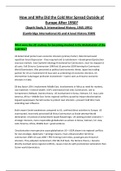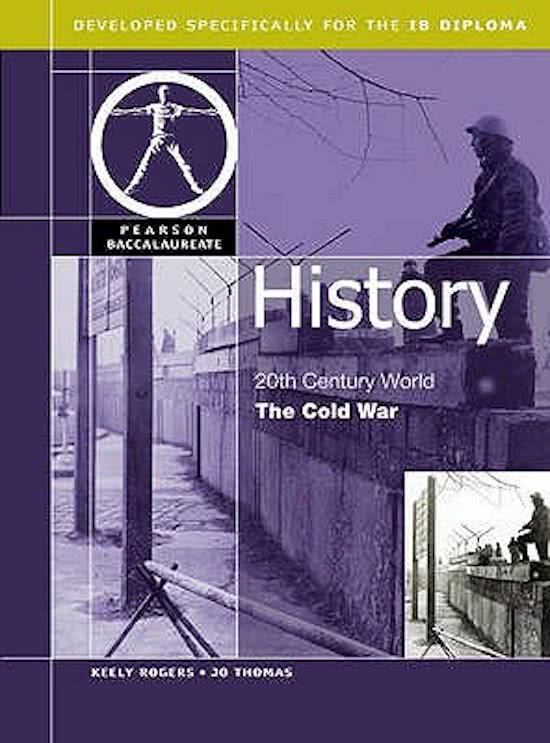How and Why Did the Cold War Spread Outside of
Europe After 1950?
(Depth Study 3: International History, 1945-1991)
(Cambridge International AS and A level History 9389)
What were the US’ motives for becoming involved in the Globalisation of the
Cold War?
US determined protect own economic interests (primary factor). Determined avoid
repetition Great Depression - they required end to isolationism + development/protection
overseas markets. Saw Capitalist ideology threatened by Communism, must be stopped at
all costs. Fall China to Communism 1949 led US perceive USSR forming for Communist
World Domination. Was perceived as political and economic threat. Japan key trading
partner for US so involvement SE Asia seen as protecting US economic interests. US
intervention Cuba began preSoviet involvement + Castro seen as threat to economic
interests in Cuba.
Oil key factor USA's involvement Middle East. Involvements in Africa as need for markets,
raw materials + mineral wealth. USA's overreacted real aims Communism. Led to
Containment, Rollback, Domino theory. US involvement in Korea, Vietnam, S.E. Asia, Latin
America, Africa + Middle East. Series regional conflicts caused by impact decolonization.
Argued superpowers forced involve to protect own interests + prevent Cold War rivals
extending own influence.
Stalin aware Soviet weaknesses compared to US, confined direct activities to Europe. US
overreacted, incorrectly perceived fall China Communism as Soviet attempt World
domination. US policies (Containment) based flawed logic. US seeking protect economic +
strategic interests, more responsible globalisation as actions in Korea, Vietnam, S.E. Asia,
Latin America, Africa, Middle East = good evidence.
Decolonisation more genuine cause globalisation.US + USSR drawn into regional conflicts
for own strategic, diplomatic + prestige reasons. Fears enhanced after fall China
communism 1949; US saw USSR + PRC forming Comm bloc, posed genuine threat US
interests. They adopted containment, NSC 68, Roll back, the Domino theory + became
directly involved series regional conflicts, causes more do with postcolonial nationalism than
Comm world domination.
, Unwelcome US intervention led countries seek help + support from USSR, spreaded CW.
Globalisation occurred as fear + need USA + USSR maintain respective political, economic
strategic + prestige interests. US fears 'monolithic comm attempt world domination
misguided, US attempted contain something which over exaggerated. Argued US over-
reacted which led Containment, Roll back, NSC-68 + Domino theory.
US involved in series regional conflicts, causes postcolonial nationalism in Korea, Vietnam,
Cambodia, Laos, Cuba, Chile, Mozambique, Angola etc. Unwelcome US intervention led
countries support from USSR. Spreading CW US support unpopular + undemocratic regimes
in countries + actions CIA across globe. US more responsible globalisation CW determined
preserve econ influence, US incorrectly perceived comm plot take world. Enhanced
Containment policy through NSC 68, Roll-back + Domino theory, US involvement Korea,
Vietnam, SE Asia, Latin America, Africa + M-East. In pursuing policies encouraged
emergence comm regimes like Cambodia +Laos.
'Red threat' led US involvement Korea, Vietnam, the Middle East, Africa and Latin America,
globalising CW. US directly involved Korea + Vietnam, USSR was not. CMC caused by US
overreaction to Castro. In name protecting world communism, supported non-democratic
govs. The US nuke programme globalise CW. US interpreted USSR actions Korea + Nam
1950. 1950's US believed Comm expansionist monolithic bloc, leaders seen as puppets
MOSCOW. In M-East + Guatemala US failed distinguish nationalism + Communism,
misinterpreted USSR policy as monolithic bloc controlling leaders in region, Eisenhower
used CIA to replace leaders. Nasser labelled comm, was nationalist exploited rivalry US +
USSR. Built Aswan Dam + modernized Egypt.
US interpreted Stalin + Ho Chi Minh as expansionist. US changed policy as supported French
control Nam, aided war effort paid 80% until Dien Bien Phu in 1954. Eisenhower Doctrine
1957, M-East strategic national importance + Congress gave Eisenhower carte blanche
protect region in belief USSR expansionist. Eisenhower sent $10 million to Jordan + 10 000
troops Lebanon 1957 contain Comm. US saw as defender ‘free world’ from Comm
infiltration.
What were the aims of Soviet policy makers and why did they get involved in
certain areas?
Stalin's overt statements world Comm rev. USSR support Comm takeover China. USSR
involvement Korea, Cuba, Vietnam, Africa, M-East. Statesmen exploit CW for own benefit.
Khrushchev distanced USSR from Marxist world rev concept, key factor deterioration
SinoSoviet relations. USSR not supply N. Korea, own involvement in K. War limited, less than
US involvement. Stalin gave permission N invade S. on basis that US not involve as avoid
direct confrontation. USSR support Comm S.E Asia low-key.





